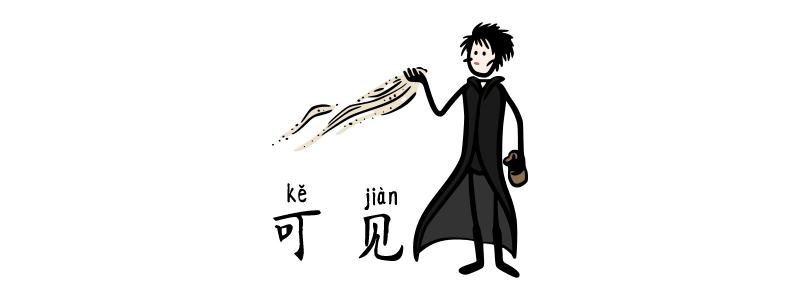Grammar Point:
In Chinese, the word 可见 kějiàn is a conjunction that that can be translated as “indicate” or “means.” It is often used to summarize the meaning of a previous statement.
Structure
Situation + kějiàn + Conclusion
可见 kějiàn is often used when a speaker wants to express a judgment or insight based on facts, observations, or evidence. Although it is commonly seen in formal or written Chinese, it is also used in spoken language to convey logical conclusions.
他能夠出國,可見家境並不窮他能够出国,可见家境并不穷
He can go abroad, which shows that his family is not poor.
他一年就能考過HSK4,可見中文並不難他一年就能考过HSK4,可见中文并不难
He can pass HSK4 in just one year, which means that Chinese is not difficult.
你已經病了5天了,可見你吃的藥完全沒有用你已经病了5天了,可见你吃的药完全没有用
You have been sick for 5 days, indicating that the medicine you’re taking is completely ineffective.
太太看著我微笑,可見我剛剛的回答她不滿意太太看着我微笑,可见我刚刚的回答她不满意
My wife looked at me and smiled, which shows that she wasn’t happy with my previous answer.
這學生總是找理由請假,可見他無心學習这学生总是找理由请假,可见他无心学习
This student always finds excuses to take time off, which shows that he lacks interest in learning.
考慮到她的年紀和行為,可見這孩子非常早熟考虑到她的年纪和行为,可见这孩子非常早熟
Considering her age and behavior, it is evident that this child is very mature for her age.
每次逛超市,Tiffany總是買很多泡麵,可見她是個懶惰的人每次逛超市,Tiffany总是买很多方便面,可见她是个懒惰的人
Every time she goes grocery shopping, Tiffany always buys a lot of instant noodles, which shows that she’s probably a bit lazy.
我說我要吃草莓,你卻不去買,可見你根本不愛我我说我要吃草莓,你却不去买,可见你根本不爱我
I said I wanted to eat strawberries, but you didn’t go buy them, indicating that you don’t love me at all.
FYI 👸🫅
In Chinese slang, 公主病 gōngzhǔ bìng and 王子病 wángzǐ bìng are terms for when someone acts all entitled or princessy.
公主病 gōngzhǔ bìng literally means “princess syndrome” and is used when a person, usually a woman, expects to be treated like royalty, being super demanding or sensitive. Just like the example above.
王子病 wángzǐ bìng literally means “prince syndrome” and is used when a person, usually a man, acts all high and mighty, expecting special treatment and showing off.
Practice
TouchHover over the space to see the answers.
✔️ Since I started exercising, I haven’t been sick, which shows that exercise can keep the body healthy.
我開始運動以後就沒生過病了,可見運動能讓身體健康我开始运动以后就没生过病了,可见运动能让身体健康
✔️ You don’t understand what I’m saying, which shows that your Chinese is not good enough yet.
你聽不懂我說什麼,可見你的中文還不夠好你听不懂我说什么,可见你的中文还不够好
✔️ That teacher has been teaching for 10 years, which shows that she is really good at teaching Chinese.
那位老師已經教了10年了,可見她是真的會教中文那位老师已经教了10年了,可见她是真的会教中文


